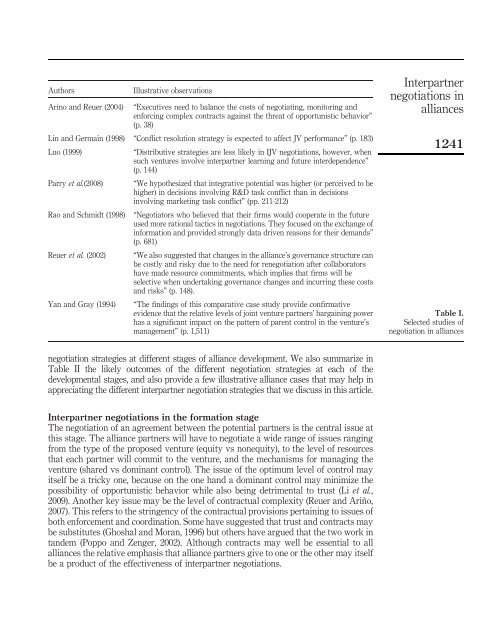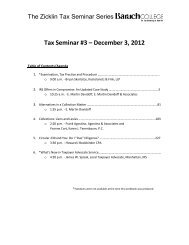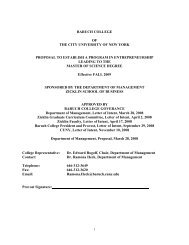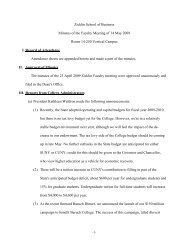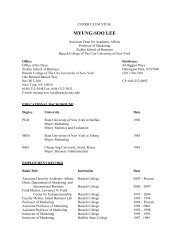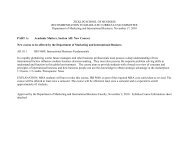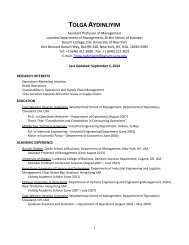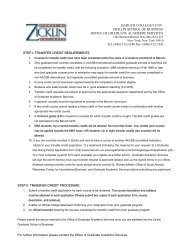alliances a strategic framework
Download - zicklin : school of business - CUNY
Download - zicklin : school of business - CUNY
- No tags were found...
You also want an ePaper? Increase the reach of your titles
YUMPU automatically turns print PDFs into web optimized ePapers that Google loves.
Authors<br />
Illustrative observations<br />
Arino and Reuer (2004) “Executives need to balance the costs of negotiating, monitoring and<br />
enforcing complex contracts against the threat of opportunistic behavior”<br />
(p. 38)<br />
Lin and Germain (1998) “Conflict resolution strategy is expected to affect JV performance” (p. 183)<br />
Luo (1999)<br />
“Distributive strategies are less likely in IJV negotiations, however, when<br />
such ventures involve interpartner learning and future interdependence”<br />
(p. 144)<br />
Parry et al.(2008)<br />
Rao and Schmidt (1998)<br />
Reuer et al. (2002)<br />
Yan and Gray (1994)<br />
“We hypothesized that integrative potential was higher (or perceived to be<br />
higher) in decisions involving R&D task conflict than in decisions<br />
involving marketing task conflict” (pp. 211-212)<br />
“Negotiators who believed that their firms would cooperate in the future<br />
used more rational tactics in negotiations. They focused on the exchange of<br />
information and provided strongly data driven reasons for their demands”<br />
(p. 681)<br />
“We also suggested that changes in the alliance’s governance structure can<br />
be costly and risky due to the need for renegotiation after collaborators<br />
have made resource commitments, which implies that firms will be<br />
selective when undertaking governance changes and incurring these costs<br />
and risks” (p. 148).<br />
“The findings of this comparative case study provide confirmative<br />
evidence that the relative levels of joint venture partners’ bargaining power<br />
has a significant impact on the pattern of parent control in the venture’s<br />
management” (p. 1,511)<br />
Interpartner<br />
negotiations in<br />
<strong>alliances</strong><br />
1241<br />
Table I.<br />
Selected studies of<br />
negotiation in <strong>alliances</strong><br />
negotiation strategies at different stages of alliance development. We also summarize in<br />
Table II the likely outcomes of the different negotiation strategies at each of the<br />
developmental stages, and also provide a few illustrative alliance cases that may help in<br />
appreciating the different interpartner negotiation strategies that we discuss in this article.<br />
Interpartner negotiations in the formation stage<br />
The negotiation of an agreement between the potential partners is the central issue at<br />
this stage. The alliance partners will have to negotiate a wide range of issues ranging<br />
from the type of the proposed venture (equity vs nonequity), to the level of resources<br />
that each partner will commit to the venture, and the mechanisms for managing the<br />
venture (shared vs dominant control). The issue of the optimum level of control may<br />
itself be a tricky one, because on the one hand a dominant control may minimize the<br />
possibility of opportunistic behavior while also being detrimental to trust (Li et al.,<br />
2009). Another key issue may be the level of contractual complexity (Reuer and Ariño,<br />
2007). This refers to the stringency of the contractual provisions pertaining to issues of<br />
both enforcement and coordination. Some have suggested that trust and contracts may<br />
be substitutes (Ghoshal and Moran, 1996) but others have argued that the two work in<br />
tandem (Poppo and Zenger, 2002). Although contracts may well be essential to all<br />
<strong>alliances</strong> the relative emphasis that alliance partners give to one or the other may itself<br />
be a product of the effectiveness of interpartner negotiations.


